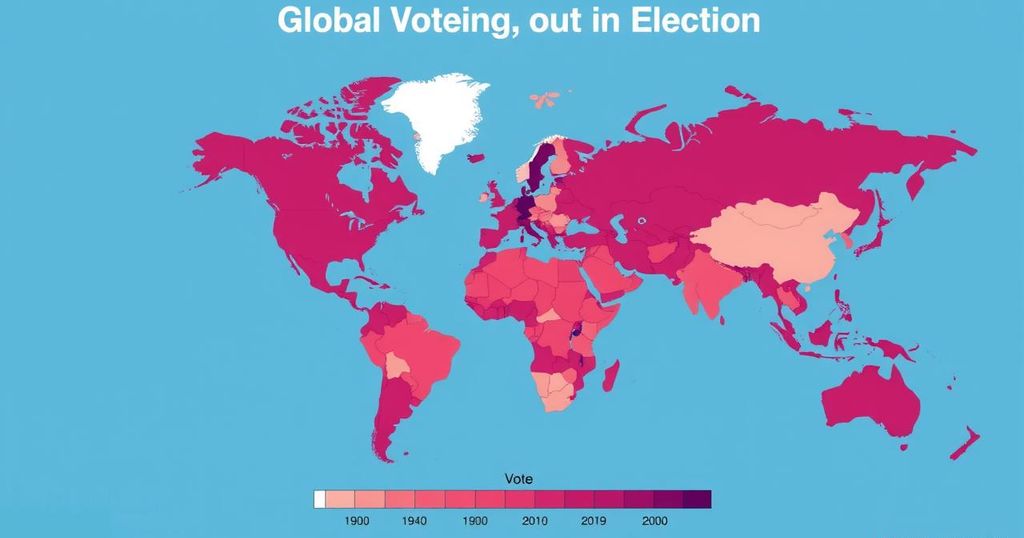2024 Elections: A Reflection on Global Voter Behavior and Democracy’s Challenges

In 2024, elections across over 60 countries, representing nearly half the world’s population, revealed a troubling trend of voters prioritizing immediate concerns over collective well-being, particularly regarding economic issues. Notable electoral outcomes included significant shifts in leadership and public sentiment, as both incumbents and populist candidates faced considerable challenges amidst a backdrop of global economic distress and political volatility.
In 2024, a significant democratic milestone occurred as over 60 countries, representing nearly half of the world’s population, participated in elections to select their leaders. However, the outcomes indicated a concerning trend where voters prioritized immediate personal interests over collective well-being. Economic concerns overshadowed critical issues such as climate change, leading to decisive electoral shifts in many countries.
For instance, in the United Kingdom, the Labour Party, led by Keir Starmer, triumphed over the Conservatives largely due to public dissatisfaction with economic conditions. In the United States, President Joe Biden faced backlash despite reducing inflation, leading many voters to favor Donald Trump, who had previously perpetuated a narrative of misinformation regarding climate change. This demonstrates a prevalent pattern where incumbents are frequently punished at the polls, reflecting voters’ immediate financial anxieties.
The electoral landscape was vibrant, with elections occurring across diverse nations from Algeria to Taiwan. Notably, incumbents, including Narendra Modi in India and Olaf Scholz in Germany, faced losses or significant reductions in their political standing. The growing challenges posed by populist sentiments became evident as traditional parties lost their hold in multiple regions, indicating a shifting political paradigm.
Amidst these developments, the political fates of leaders like Emmanuel Macron in France are particularly instructive. Following a wave of populism in Europe, Macron’s call for early parliamentary elections underscored the urgency of addressing voter discontent stemming from economic distress globally, exacerbated by external factors such as the COVID-19 pandemic and the war in Ukraine. While Macron’s strategic decisions aimed to fortify his administration, they also unveiled vulnerabilities in the face of changing voter sentiment, reflecting how crucial economic performance is for political stability.
Russia’s electoral scenario starkly contrasts Western democracies, illustrating the darker side of democratic practices under authoritarian regimes, particularly with Vladimir Putin securing an overwhelming majority amidst international condemnation and significant electoral manipulation. As next year unfolds, the implications of Trump’s re-election, coupled with Putin’s dubious victory, may set the stage for critical geopolitical tensions, particularly concerning Ukraine’s ongoing conflict.
Overall, the 2024 elections signal both the resilience and fragility of the democratic model. The lessons drawn from this year’s voting patterns, including the prioritization of economic issues and the rise of populism, underline the complex dynamics shaping global politics. As the world looks towards 2025, there lies a critical juncture where history, governance, and the electorate’s evolving preferences will continue to influence the future of democracy on a global scale.
The year 2024 marked a significant turning point in global democracy, as nearly half of the world’s population engaged in the electoral process, reflecting a growing trend towards democratic governance. This wave of elections provided valuable insights into voting behaviors, revealing that immediate economic concerns often take precedence over broader collective issues. These dynamics have implications for the stability of emerging democracies while also showcasing the challenges posed by populism and authoritarianism in established electoral frameworks.
The 2024 elections have illuminated crucial lessons about the essence of democracy, primarily how individual economic concerns eclipse collective welfare, influencing voting patterns worldwide. The geopolitical consequences of these elections, particularly regarding leaders like Trump and Putin, pose significant challenges for international relations as emerging democracies navigate their paths forward. The outcomes signal a continuing evolution of democratic practices, underscoring the importance of adaptive governance in responding to changing voter expectations.
Original Source: edition.cnn.com








